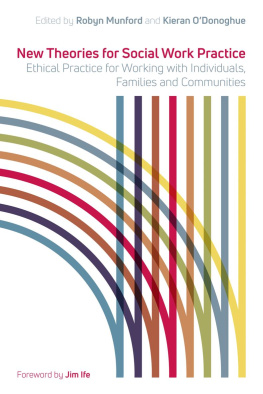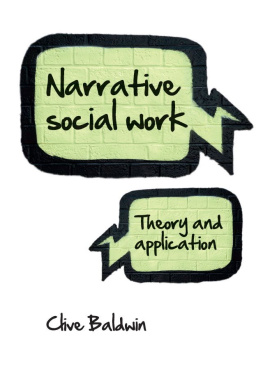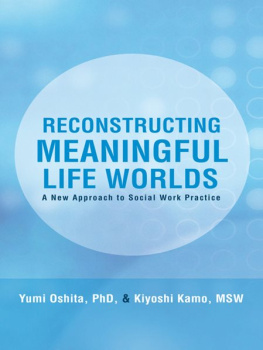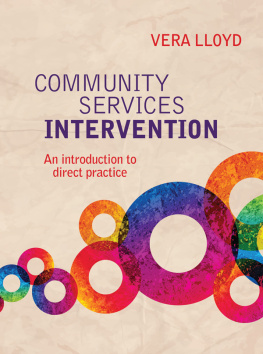MAKING SENSE OF THEORY
AND ITS APPLICATION TO SOCIAL WORK PRACTICE
Other books you may be interested in:
Anti-racism in Social Work Practice
Edited by Angie Bartoli ISBN 978-1-909330-13-9
Mental Health and the Criminal Justice System
Ian Cummins ISBN 978-1-910391-90-7
Modern Mental Health: Critical Perspectives on Psychiatric Practice
Edited by Steven Walker ISBN 978-1-909330-53-5
Observing Children and Families: Beyond the Surface
By Gill Butler ISBN 978-1-910391-62-4
Psychosocial and Relationship-based Practice
By Claudia Megele ISBN 978-1-909682-97-9
Social Media and Social Work Education
Edited by Joanne Westwood ISBN 978-1-909682-57-3
Understanding Substance Use: Policy and Practice
By Elaine Arnull ISBN 978-1-909330-93-1
Whats Your Problem? Making sense of Social Policy and the Policy Process
By Stuart Connor ISBN 978-1-909330-49-8
Titles are also available in a range of electronic formats. To order please go to our website www.criticalpublishing.com or contact our distributor NBN International, 10 Thornbury Road, Plymouth PL6 7PP, telephone 01752 202301 or email orders@nbninternational.com
MAKING SENSE OF THEORY
AND ITS APPLICATION TO SOCIAL WORK PRACTICE
Phil Musson
First published in 2017 by Critical Publishing Ltd
All rights reserved. No part of this publication may be reproduced, stored in a retrieval system, or transmitted in any form or by any means, electronic, mechanical, photocopying, recording or otherwise, without prior permission in writing from the publisher.
Copyright 2017 Phil Musson
British Library Cataloguing in Publication Data
A CIP record for this book is available from the British Library
ISBN: 978-1-911106-64-7
This book is also available in the following e-book formats:
MOBI ISBN: 978-1-911106-65-4
EPUB ISBN: 978-1-911106-66-1
Adobe e-book ISBN: 978-1-911106-67-8
The rights of Phil Musson be identified as the Author of this work have been asserted by him in accordance with the Copyright, Design and Patents Act 1988.
Cover design by Out of House
Text design by Greensplash Limited
Project Management by Out of House Publishing
Printed and bound in Great Britain by TJ International, Padstow, Cornwall
Critical Publishing
3 Connaught Road
St Albans
AL3 5RX
www.criticalpublishing.com
Man often becomes what he believes himself to be. If I keep on saying to myself that I cannot do a certain thing, it is possible that I may end by really becoming incapable of doing it. On the contrary, if I have the belief that I can do it, I shall surely acquire the capacity to do it even if I may not have it at the beginning.
Mahatma Gandhi
This book is dedicated to those who have been courageous enough to develop the belief that they can do it and to the numerous and varied practitioners that have supported their endeavour.
Contents
Phil Mussons career in social work has been one of continual development from student to skilled practitioner to training officer to senior lecturer. He readily acknowledges that social work is a demanding occupation at both emotional and intellectual levels. He also acknowledges a sense of privilege in having spent the majority of his working life as a social worker and latterly as a facilitator in the learning and development of others who are or wish to also become qualified social work practitioners. It is, he believes, incumbent on the practitioner to have a conscious and deliberate understanding of why and how they intervene in the lives of their service users and he hopes this book will make a valued contribution towards that understanding.
We are curious beings, always wanting to know the whys and wherefores of this and that. We ask why things behave one way rather than another. We wonder why people do what they do. The need to make sense drives us to reflect, think and come up with ideas, to have theories. The field of human development and individual behaviour, social interaction and personal relationships is a particularly complex and messy bit of the world of which to make sense. It is also the bit which we have to understand if we are to have any chance of getting by, personally and professionally. However, being so busy and tangled, making sense of the social world is not always easy or straightforward. This is why the social and psychological sciences have generated so many different theories, each trying to make sense of human development, individual behaviour and social interaction. And to make matters worse, these many theories often dont agree with one another. Disputes and debates have been rife ever since men and women first asked questions such as: How should we raise our children? How should we behave? What is a good life? How should we live together? Social workers, of course, find themselves grappling with the muddle of the human condition on a daily basis. This is why the profession is awash with a bewildering array of theories.
However, the old adage that there is nothing so practical as a good theory remains true. And if social life, particularly the slice with which social workers find themselves dealing, is so complicated, then it should come as no surprise that the profession finds itself with so many theories as it tries to make sense of individuals, their relationships and the society in which they live. This is why social work practice stimulates as much as it challenges, rewards as much as it frustrates. Even so, we need help if we are to navigate our way through and around the crowded curriculum of theories and their methods. And happily, a new guiding hand now comes along in the form of Phil Musson and his book, Making Sense of Theory and its Application to Social Work Practice. Phil takes us on a personal journey as he introduces and explains, applies and evaluates many of the major theories and approaches that currently populate social work practice. One of the neat, clarifying devices he uses to help the reader understand and take stock of each theory, is to apply each one, in turn, to the same case the case of Annette and her family to see what that particular theory has to say about what is going on, why it might be happening, and what might be done about it. The recognition that social workers have to deal with situations that are generally fuzzy, shifting and dynamic is thoughtfully handled. As each theory is used to look at Annette and her circumstances, so the focus of interest changes and the angle of understanding shifts. The author encourages the reader to be open-minded. In recognising that complexity and uncertainty characterise many of the cases held by social workers, Phil Musson believes that taking a rounded approach is likely to be more effective and ethically sound. The result is an easy-to-read, compact and smartly ordered review of the professions theories and their application.










